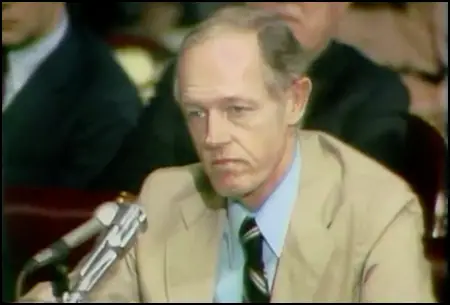On this day on 23rd January
On this day in 1915 anti-slavery artist Anne Whitney died. Anne Whitney was born in Watertown, Massachusetts, on 2nd September, 1821. She ran a school in Salem, before moving to New York to study art. Whitney had her first exhibition at the National Academy of Design in 1860.
A passionate opponent of slavery and an advocate of women's rights, Whitney's work often reflected her political beliefs. This included sculptured busts of Lucy Stone, Harriet Beecher Stowe, Frances Willard, Harriet Martineau, Mary Livermore and William Lloyd Garrison.
Whitney was also asked by the city of Boston to create a monument to celebrate the achievements of Charles Sumner. However, when the officials discovered that Whitney was a woman, they withdrew the commission. Whitney, who had been a political supporter of Sumner in his campaign against slavery, decided to produce the statue anyway. It now stands outside Harvard Law School.
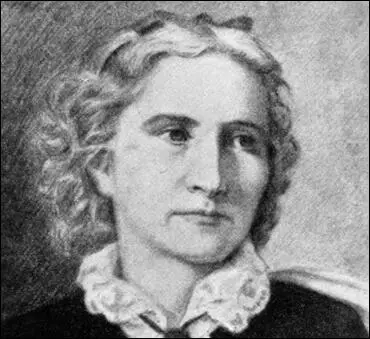
On this day in 1928 Edmund Duffy produces a cartoon on the Ku Klux Klan. Duffy's first drawings appeared in the New York Tribune. He moved to London and worked for the London Evening News. Duffy worked in Paris for a few years, and he finally returned to the United States in 1922. He worked for two years with both the New York Leader and the Brooklyn Eagle.
He joined the Baltimore Sun as a cartoonist in 1924. The following year he went to Tennessee with H. L. Mencken to report on the Scopes Trial. The two men worked together for the next twenty-five years. Mencken valued Duffy's work very highly and once remarked: "Give me a good cartoonist and I can throw out half the editorial staff."
Duffy was one of the few white cartoonists willing to speak out against racial injustice. This included attacks on lynching and the Ku Klux Klan. Duffy supported the campaign led by Mary McLeod Bethune and Walter Francis White to persuade Congress to past an anti-lynching bill that had been proposed by Robert F. Wagner and Edward Costigan.
On 6th December, 1931, Edmund Duffy, published a cartoon in the Baltimore Sun about the lynching of 23 year-old Mattthew Williams by a white mob in Salisbury, Maryland, two days previously.
During Edmund Duffy's career, he won three Pulitzer Prizes. The cartoons were An Old Struggle Still Going On (27th February, 1930) that dealt with the struggle between communism and capitalism; California Points with Pride! (28th November, 1933) about California Governor James Rolph's reaction to the lynching of the killers of Brooke Hart and The Outstretched Hand (7th October, 1939) about Adolf Hitler and the invasion of Poland.
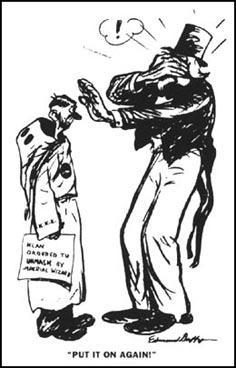
On this day in 1932 Marion Phillips died from stomach cancer, on 23rd January 1932 at the Empire Nursing Home, Vincent Square, London; she was cremated at Golders Green on 27 January.
Marion Phillips, the youngest in the family of three sons and four daughters of Phillip David Phillips (1836–1909), an Australian-born Jewish lawyer, and his wife, Rose Asher, was born on 29th October 1881, at St Kilda, near Melbourne in Australia. She was educated at home, at the Melbourne Presbyterian Ladies' College (1897–8), and then at Ormond College, part of Melbourne University, where she studied philosophy and history.
In 1904 she went to England to study at the London School of Economics (LSE). Her tutor, Graham Wallas, introduced her to Sidney Webb and Beatrice Webb. This resulted in her being employed as a research assistant into their investigation into public health, poor-law medical relief, and the treatment of destitute children. During this period she became a member of the Fabian Society, the Independent Labour Party and the National Union of Women's Suffrage Societie. In 1909 she decided to move into the Holland Park house of a fellow researcher, Dr Ethel Bentham.
Ella Winter, knew Phillips when she lived as a child in Australia. "We all admired her extravagantly - her brilliant mind and effectiveness as a speaker, her activities as suffragist, pacifist, labour organizer... It was a red-letter day for us all when Marion came. She was striking-looking, with black hair, small hands and feet, intense brown eyes - and a stout, uncorseted, ungainly body, which one forgot in the acute discussions she always brought into being. I sat on a hassock, ears and eyes glued to her, drinking in what she said about events, political personalities - she knew everyone - and policies. She made public questions so alive and fascinating that I am sure politics must fill my world; Marion lived as I wanted to live, I would pattern my career on hers. I would not need to marry, any more than she had. My life, like hers, would be in my work."
Phillips graduated DSc (Econ) with a doctoral thesis on the development of New South Wales. This was published in 1909 as "A Colonial Autocracy". In 1911 she became a lecturer at the LSE but the following year she became secretary of Women's Labour League. She also worked behind the scenes in order to develop closer links between the Fabian Society and the Labour Party.
In 1912 Phillips was elected a Labour councillor in the London borough of Kensington, where she pressed for public provision of baby clinics, school meals, improved council housing, employment schemes, and prohibition of sweated labour. As Natasha Lehrer has pointed out: "A prime motivation was the desire to see working class children being given both the protection and the opportunities that she herself had received during her happy middle-class childhood in Australia. She also fought for better medical inspection and treatment of school children."
During the First World War she was a member of the War Emergency Workers' National Committee, the Consumers' Council of the Ministry of Food, and the Central Committee on Women's Training and Employment. In 1918 she edited a volume of essays, Women and the Labour Party, which attempted to show "the contribution which the Labour Party has to make upon questions that are peculiarly the concern of women".
Phillips developed an abrasive personality. Katharine Bruce Glasier commented to Ramsay MacDonald that Phillips reminded her of Eleanor Marx in "her love of power and intrigue". She added "if only she could fall in love and mate and marry.... but just now she is as hard and cold as glass". Throughout her career Phillips was known for her powerful and abrasive manner. Beatrice Webb described her as "shrewd and capable but contentious" and in May 1918 referred to Phillips's "insolently critical attitude towards all persons and institutions" and her "sharp satirical tongue" made her "much disliked by the other leading women of the labour movement".
Her biographer, Brian Harrison, was more sympathetic and has argued: "Phillips, and many women like her, worked hard at the undramatic but necessary organizational tasks involved in creating a new political constituency, settling where necessary for the practical, but never losing sight of the ideal. She was particularly active in advancing women's interests on international bodies, and in pressing for improved working-class housing estates to include community centres with nurseries, communal kitchens, libraries, concert halls, and home-help services; all these she saw as not merely desirable in themselves but as essential to emancipate working-class housewives."
Marion Phillips was extremely hostile to the Russian Revolution. In 1921 she became involved in a heated debate with the journalist, Lincoln Steffens, who had just returned from Russia. One of her former students, Ella Winter, later described the incident: "When the conversation turned to the Russian Revolution and Bolshevism, the evening, to my dismay, exploding into astonishing hostility and bitterness from Marion Phillips. Like the official Labour Party, she was implacably opposed to the Russian Revolution, but it did not occur to me that her enmity and personal rudeness may have been partly due to her realization that she was losing me."
Phillips upset some women activists by strongly opposing committing the Labour Party to promoting birth control in the 1920s. She was concerned that it would lose votes from the Roman Catholic working-class She told one of the campaigners, Dora Russell, "sex should not be dragged into politics" and the birth-control issue had the power to "split the party from top to bottom".
In the 1929 General Election Phillips was elected to represent the constituency of Sunderland. The Conservative Party won 8,664,000 votes, the Labour Party 8,360,000 and the Liberal Party 5,300,000. However, the bias of the system worked in Labour's favour, and in the House of Commons the party won 287 seats, the Conservatives 261 and the Liberals 59. Ramsay MacDonald became Prime Minister, but as before, he still had to rely on the support of the Liberals to hold onto power.
The election of the Labour Government coincided with an economic depression and MacDonald was faced with the problem of growing unemployment. In January 1929, 1,433,000 people were out of work, a year later it reached 1,533,000. By March 1930, the figure was 1,731,000. In June it reached 1,946,000 and by the end of the year it reached a staggering 2,725,000. That month MacDonald invited a group of economists, including John Maynard Keynes, J. A. Hobson, George Douglas Cole and Walter Layton, to discuss this problem. However, he rejected all those ideas that involved an increase in public spending.
In March 1931 Ramsay MacDonald asked Sir George May, to form a committee to look into Britain's economic problems. The committee included two members that had been nominated from the three main political parties. At the same time, John Maynard Keynes, the chairman of the Economic Advisory Council, published his report on the causes and remedies for the depression. This included an increase in public spending and by curtailing British investment overseas.
The Chancellor of the Exchequer, Philip Snowden, rejected these ideas and this was followed by the resignation of Charles Trevelyan, the Minister of Education. "For some time I have realised that I am very much out of sympathy with the general method of Government policy. In the present disastrous condition of trade it seems to me that the crisis requires big Socialist measures. We ought to be demonstrating to the country the alternatives to economy and protection. Our value as a Government today should be to make people realise that Socialism is that alternative."
When the May Committee produced its report in July, 1931, it forecast a huge budget deficit of £120 million and recommended that the government should reduce its expenditure by £97,000,000, including a £67,000,000 cut in unemployment benefits. The two Labour Party nominees on the committee, Arthur Pugh and Charles Latham, refused to endorse the report.
The cabinet decided to form a committee consisting of Ramsay MacDonald, Philip Snowden, Arthur Henderson, Jimmy Thomas and William Graham to consider the report. On 5th August, John Maynard Keynes wrote to MacDonald, describing the May Report as "the most foolish document I ever had the misfortune to read." He argued that the committee's recommendations clearly represented "an effort to make the existing deflation effective by bringing incomes down to the level of prices" and if adopted in isolation, they would result in "a most gross perversion of social justice". Keynes suggested that the best way to deal with the crisis was to leave the Gold Standard and devalue sterling. Two days later, Sir Ernest Harvey, the deputy governor of the Bank of England, wrote to Snowden to say that in the last four weeks the Bank had lost more than £60 million in gold and foreign exchange, in defending sterling. He added that there was almost no foreign exchange left.
Ramsay MacDonald went to see George V about the economic crisis on 23rd August. He warned the King that several Cabinet ministers were likely to resign if he tried to cut unemployment benefit. MacDonald wrote in his diary: "King most friendly and expressed thanks and confidence. I then reported situation and at end I told him that after tonight I might be of no further use, and should resign with the whole Cabinet.... He said that he believed I was the only person who could carry the country through."
According to Harold Nicolson, the King decided to consult the leaders of the Conservative and Liberal Parties. Herbert Samuel told the King that he should try and persuade MacDonald to make the necessary economies. Stanley Baldwin agreed and said he was willing to serve under MacDonald in a National Government.
After another Cabinet meeting where no agreement about how to deal with the economic crisis could be achieved, Ramsay MacDonald went to Buckingham Palace to resign. Sir Clive Wigram, the King's private secretary, later recalled that George V "impressed upon the Prime Minister that he was the only man to lead the country through the crisis and hoped that he would reconsider the situation." At a meeting with Stanley Baldwin, Neville Chamberlain and Herbert Samuel MacDonald told them that if he joined a National Government it "meant his death warrant". According to Chamberlain he said "he would be a ridiculous figure unable to command support and would bring odium on us as well as himself."
On 24th August 1931 Ramsay MacDonald returned to the palace and told the King that he had the Cabinet's resignation in his pocket. The King replied that he hoped that MacDonald "would help in the formation of a National Government." He added that by "remaining at his post, his position and reputation would be much more enhanced than if he surrendered the Government of the country at such a crisis." Eventually, he agreed to form a National Government. Marion Phillips, like most Labour Party MPs was appalled by what they considered to be MacDonald's act of treachery.
On 8th September 1931, the National Government's programme of £70 million economy programme was debated in the House of Commons. This included a £13 million cut in unemployment benefit. Tom Johnson, who wound up the debate for the Labour Party, declared that these policies were "not of a National Government but of a Wall Street Government". In the end the Government won by 309 votes to 249, but only 12 Labour M.P.s voted for the measures.
On 26th September, the Labour Party National Executive decided to expel all members of the National Government including Ramsay MacDonald, Philip Snowden, Jimmy Thomas and John Sankey. As David Marquand has pointed out: "In the circumstances, its decision was understandable, perhaps inevitable. The Labour movement had been built on the trade-union ethic of loyalty to majority decisions. MacDonald had defied that ethic; to many Labour activists, he was now a kind of political blackleg, who deserved to be treated accordingly."
The 1931 General Election was held on 27th October, 1931. MacDonald led an anti-Labour alliance made up of Conservatives and National Liberals. It was a disaster for the Labour Party with only 46 members winning their seats. Phillips was one of those who lost their seats.
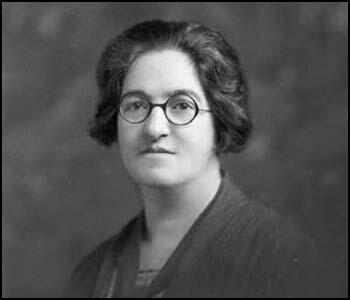
On this day 1937 the show trial began of Yuri Piatakov, Karl Radek, Grigori Sokolnikov, and fifteen other leading members of the Communist Party. They were accused of working with Leon Trotsky in an attempt to overthrow the Soviet government with the objective of restoring capitalism. Robin Page Arnot, a leading figure in the British Communist Party, wrote: "A second Moscow trial, held in January 1937, revealed the wider ramifications of the conspiracy. This was the trial of the Parallel Centre, headed by Piatakov, Radek, Sokolnikov, Serebriakov. The volume of evidence brought forward at this trial was sufficient to convince the most sceptical that these men, in conjunction with Trotsky and with the Fascist Powers, had carried through a series of abominable crimes involving loss of life and wreckage on a very considerable scale."
Edvard Radzinsky, the author of Stalin (1996) has pointed out: "After they saw that Piatakov was ready to collaborate in any way required, they gave him a more complicated role. In the 1937 trials he joined the defendants, those whom he had meant to blacken. He was arrested, but was at first recalcitrant. Ordzhonikidze in person urged him to accept the role assigned to him in exchange for his life. No one was so well qualified as Piatakov to destroy Trotsky, his former god and now the Party's worst enemy, in the eyes of the country and the whole world. He finally agreed I to do it as a matter of 'the highest expediency,' and began rehearsals with the interrogators."
One of the journalists covering the trial, Lion Feuchtwanger, commented: "Those who faced the court could not possibly be thought of as tormented and desperate beings. In appearance the accused were well-groomed and well-dressed men with relaxed and unconstrained manners. They drank tea, and there were newspapers sticking out of their pockets... Altogether, it looked more like a debate... conducted in conversational tones by educated people. The impression created was that the accused, the prosecutor, and the judges were all inspired by the same single - I almost said sporting - objective, to explain all that had happened with the maximum precision. If a theatrical producer had been called on to stage such a trial he would probably have needed several rehearsals to achieve that sort of teamwork among the accused."
Yuri Piatakov and twelve of the accused were found guilty and sentenced to death. Karl Radek and Grigori Sokolnikov were sentenced to ten years. Feuchtwanger commented that Radek "gave the condemned men a guilty smile, as though embarrassed by his luck." Maria Svanidze, who was later herself to be purged by Joseph Stalin wrote in her diary: "They arrested Radek and others whom I knew, people I used to talk to, and always trusted.... But what transpired surpassed all my expectations of human baseness. It was all there, terrorism, intervention, the Gestapo, theft, sabotage, subversion.... All out of careerism, greed, and the love of pleasure, the desire to have mistresses, to travel abroad, together with some sort of nebulous prospect of seizing power by a palace revolution. Where was their elementary feeling of patriotism, of love for their motherland? These moral freaks deserved their fate.... My soul is ablaze with anger and hatred. Their execution will not satisfy me. I should like to torture them, break them on the wheel, burn them alive for all the vile things they have done."
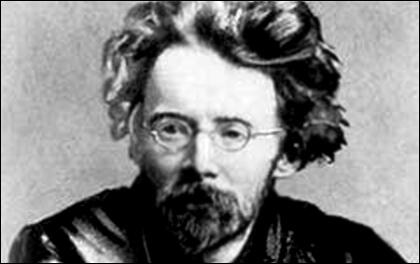
On this day in 1941 Charles Lindbergh argues that the United States negotiate a neutrality pact with Adolf Hitler. In 1936 Lindbergh made his first visit to Nazi Germany. Over the next few years he returned to the country several times.
In September 1940, Lindbergh helped Burton K. Wheeler and Norman Thomas to form the America First Committee (AFC). I t soon became the most powerful isolationist group in the United States. The AFC had four main principles: (1) The United States must build an impregnable defense for America; (2) No foreign power, nor group of powers, can successfully attack a prepared America; (3) American democracy can be preserved only by keeping out of the European War; (4) "Aid short of war" weakens national defense at home and threatens to involve America in war abroad.
President Franklin D. Roosevelt was worried about the impact that Lindbergh was having on American public opinion. He decided to recruit J. Edgar Hoover, the head of the FBI, in his campaign against Lindbergh. Roosevelt's attorney general, Robert Jackson commented, "The two men liked and understood each other." Roosevelt asked J. Edgar Hoover to investigate Charles Lindbergh, one of the leaders of the American First Committee. He willingly did so for he had been upset by Lindbergh's critical comments about the failures of the FBI investigation into the kidnapping and murder of his infant son. He also provided detailed reports on other isolationists such as Burton K. Wheeler, Gerald Nye and Hamilton Fish.
Roosevelt wrote to Hoover thanking him for this information. "I have intended writing you for some time to thank you for the many interesting and valuable reports that you have made to me regarding the fast moving situations of the last few months." Hoover replied on 14th June, 1940: "The letter is one of the most inspiring messages which I have ever been privileged to receive; and, indeed, I look upon it as rather a symbol of the principles for which our Nation stands. When the President of our country, bearing the weight of untold burdens, takes the time to express himself to one of his Bureau heads, there is implanted in the hearts of the recipients a renewed strength and vigor to carry on their tasks."
On 13th February, 1941, the President approved the establishment of "a small special intelligence and fact finding unit" that would be led by the journalist, John Franklin Carter. Carter later admitted: "The overall condition was attached to the operation by President Roosevelt that it should be entirely secret and would be promptly disavowed in the event of publicity... That year's military appropriations act included an Emergency Fund for the President, from which FDR transferred $10,000 to the State Department... to finance Carter, ostensibly by buying from him surveys on conditions in various countries, with Germany leading the list."
Adolf Berle was placed in charge of distributing the funds. On 20th February, Berle recorded: ""Jay Franklin (J.F. Carter) came in to see me today. He stated as a result of his conversation with the President and with you, and preparatory to the work he had been asked to do, he had spent some seven hundred dollars, and that he would be broke by the end of this week.... He wanted an advance of some kind against the compensation which he would eventually receive for his work. Accordingly I lent him seven hundred dollars.... I am not, of course, familiar with what the President has asked him to do, nor do I wish to be."
On 21st April, 1941, Rex Stout made a speech in New York City where he attacked the activities of Lindbergh: "I wish I could look you in the eye, Colonel Lindbergh, when I tell you that you simply don't know what it's all about.... A desperate war is being fought, and the winners of the war will win the oceans. No matter what we do, we shall be either one of the winners, or one of the losers; no shivering neutral will get a bite of anything but crow when the shooting stops. It would therefore seem to be plain imbecility not to go in with Britain and win.... Every fascist and pro-Nazi publication in America, without exception, applauds and approves of him.... Dozens of times in the past year he has been enthusiastically quoted in the newspapers of Germany and Italy and Japan."
Stout then went onto defend himself against the attacks he had received from America First Committee: "The America First Committee is calling people like me, who are convinced that we should go in with Britain now and win, a gang of warmongers.... If a 1941 warmonger is a man who advocates that we should immediately send warships and the men we have trained to sail them and shoot their guns, and airplanes and the boys we have trained to fly them and drop their bombs, send them to meet our acknowledged deadly enemy where he is, and attack him and defeat him, then count me in."
President Franklin D. Roosevelt was furious with Lindbergh after a speech he made on 23rd April, 1941, which included the following passage: "It is not only our right but it is our obligation as American citizens to look at this war objectively and to weigh our chances for success if we should enter it. I have attempted to do this, especially from the standpoint of aviation; and I have been forced to the conclusion that we cannot win this war for England, regardless of how much assistance we extend. I ask you to look at the map of Europe today and see if you can suggest any way in which we could win this war if we entered it. Suppose we had a large army in America, trained and equipped. Where would we send it to fight? The campaigns of the war. show only too clearly how difficult it is to force a landing, or to maintain an army, on a hostile coast."
On 11th September, 1941, Lindbergh made a controversial speech in Des Moines: "The three most important groups who have been pressing this country toward war are the British, the Jewish and the Roosevelt administration. Behind these groups, but of lesser importance, are a number of capitalists, Anglophiles and intellectuals who believe that their future, and the future of mankind, depends upon the domination of the British Empire... These war agitators comprise only a small minority of our people; but they control a tremendous influence... It is not difficult to understand why Jewish people desire the overthrow of Nazi Germany... But no person of honesty and vision can look on their pro-war policy here today without seeing the dangers involved in such a policy, both for us and for them. Instead of agitating for war, the Jewish groups in this country should be opposing it in every possible way, for they will be among the first to feel its consequences." Henry Ford showed his commitment to the America First Committee, by employing as a member of his executive staff.
Lindbergh speech resulted in some critics describing him as anti-Semitic. He recorded in his diary on 18th September that John T. Flynn, one of the leaders of the America First Committee paid him a visit: "John Flynn came at 11:00; and we talked the situation over for an hour. Flynn says he does not question the truth of what I said at Des Moines, but feels it was inadvisable to mention the Jewish problem. It is difficult for me to understand Flynn's attitude. He feels as strongly as I do that the Jews are among the major influences pushing this country toward war. He has said so frequently, and he says so now. He is perfectly willing to talk about it among a small group of people in private. But apparently he would rather see us get into the war than mention in public what the Jews are doing, no matter how tolerantly and moderately it is done."
According to Joseph E. Persico, the author of Roosevelt's Secret War (2001): "Within days, he delivered a fifty-page report for placement in the President's night time reading file. Thus armed, FDR was able to fire back when a reporter at a press conference asked him why Colonel Lindbergh had not been called to active duty. That was simple. Lindbergh, the President explained, was the equivalent of the arch-Civil War Copperhead Clement L. Vallandigham. The thrust drew blood. Lindbergh wrote FDR three days later resigning his commission as a colonel in the Army Air Corps Reserve. In Roosevelt's mind, his assignment to Carter had not been prompted by personal animus. Lindbergh, in FDR's eyes, was an enemy of his country, as dangerous as any fifth columnist, and had to be exposed."
President Roosevelt told Henry Morgenthau, "If I should die tomorrow, I want you to know this. I am absolutely convinced that Lindbergh is a Nazi." He wrote to Henry Stimson and claimed that: "When I read Lindbergh's speech, I felt that it could not have been better put if it had been written by Goebbels himself. What a pity that this youngster has completely abandoned his belief in our form of government and has accepted Nazi methods because apparently they are efficient." Roosevelt asked J. Edgar Hoover to keep a watch on him. He willingly did so for he had been upset by Lindbergh's critical comments about the failures of the FBI investigation into the kidnapping and murder of his infant son.
In 1941 Henry Ford showed his commitment to the America First Committee, by employing as a member of his executive staff. This caused great controversy when on 17th December, 1941, ten days after Pearl Harbour, Lindbergh made a speech where he argued: "There is only one danger in the world-that is the yellow danger. China and Japan are really bound together against the white race. There could only have been one efficient weapon against this alliance.... Germany.... the ideal setup would have been to have had Germany take over Poland and Russia, in collaboration with the British, as a bloc against the yellow people and Bolshevism. But instead, the British and the fools in Washington had to interfere. The British envied the Germans and wanted to rule the world forever. Britain is the real cause of all the trouble in the world today."
By the spring of 1941, the British Security Coordination estimated that there were 700 chapters and nearly a million members of isolationist groups. Leading isolationists were monitored, targeted and harassed. This was often done by the Fight for Freedom, a group funded by the BSC and led by Allen Dulles. For example, when Lindbergh, made speeches, thousands of handbills were handed out attacking him as an appeaser and Nazi lover.
The AFC influenced public opinion through publications and speeches and eventually had 450 local chapters and over 800,000 members. The AFC was dissolved four days after the Japanese Air Force attacked Pearl Harbor on 7th December, 1941. Hamilton Stuyvesan Fish later recalled: "Franklin Roosevelt took us into a war without telling the people anything about it. He served an ultimatum which we knew nothing about. We were forced into the war. It was the biggest cover-up ever perpetrated in the United States of America."
On 17th December, 1941, ten days after Pearl Harbor, Lindbergh made a speech where he argued: "There is only one danger in the world-that is the yellow danger. China and Japan are really bound together against the white race. There could only have been one efficient weapon against this alliance.... Germany.... the ideal setup would have been to have had Germany take over Poland and Russia, in collaboration with the British, as a bloc against the yellow people and Bolshevism. But instead, the British and the fools in Washington had to interfere. The British envied the Germans and wanted to rule the world forever. Britain is the real cause of all the trouble in the world today."
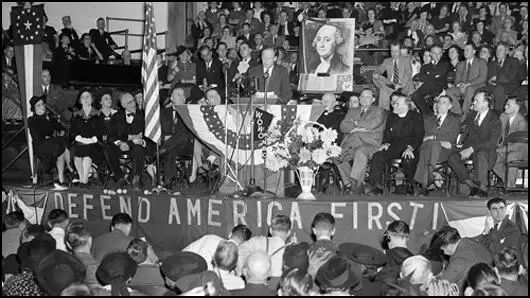
On this day in 1945 Emanuel Celler makes a speech in Congress attacking the House of Un-American Activities Committee (HUAC) that had been established in 1938. "The Committee to Investigate Un-American Activities is now a standing investigatory committee with power to initiate legislation.... The vaudevillian antics, the brass band tactics, the star chamber proceedings of the Dies Committee have put all of us on notice. Bluntly then, the present committee can make its choice. It can either adopt the Dies course of unfounded character assassinations, lynch-law, prosecutor-jury and executioner all in one - or it can proceed in a manner consonant with the American tradition of the right to be heard, the right of counsel and the right of confrontation of witnesses, placing emphasis on investigation of all foreignisms with honest judicious objectivity. If we are to have again an extravaganza of persecution - a deep-seated mania of embracing some I individually conceived notion of alienism, we face again a betrayal of our basic constitutionally guarded frights. The power to investigate is a great public trust. And we ask the newly constituted committee not for one instant to forget that."
Celler became associated with many progressive causes and was one of those attacked by Joseph McCarthy during the 1950s. He defended himself against these attacks at the 1952 Democratic National Convention: "Let's name the evil which has called this plank forth, an evil recognizable to every mature mind. It has a name - McCarthyism. Let us not underestimate the width and the depth of the fear blanketing this country because of McCarthyism. Let us not underestimate how many people, both within the Democratic and Republican Parties and the independents, are crying out for leadership to cut out this cancer. Deliberately and calculatedly, McCarthyism has set before itself the task of undermining the faith of the people in their Government. It has undertaken to sow suspicion everywhere, to set friend against friend, and brother against brother. It deals in coercion and in intimidation, tying the hands of citizens and officials with the fear of the smear attack. I have no wish to indulge in histrionics, but I do know that McCarthyism represents a danger in this country we dare not ignore. I say it is a cold hand creeping over our vitals. The fact that the author of McCarthyism was given the distinction of addressing the Republican National Convention strikes terror in the hearts of honest men. Many who have flirted with the idea of voting the Republican ticket have turned away from that ticket because of the acceptance by the Republican Party of McCarthy and McCarthyism."
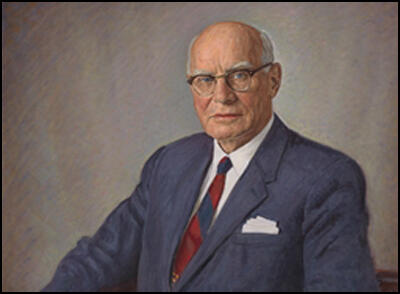
On this day in 1947 journalist James Garvin died. Garvin, the son of Michael Garvin, an Irish immigrant, and Catherine Fahy, was born at Birkenhead on 12th April 1868. His father, a sailor, was lost at sea in 1870.
In 1884 Mrs. Garvin moved her family to Hull where James found work as a clerk. Garvin had been brought up as a Roman Catholic and was a strong supporter of Irish Home Rule. The local paper, the Eastern Morning News, began publishing his letters on the subject.
By 1891 he was contributing articles to United Ireland and later that year he convinced the Newcastle Chronicle to employ him as a proof reader. He also began writing articles without payment but the editor was so impressed with his work that he was taken on as a staff reporter.
Articles on Irish politics by Garvin in the Fortnightly Review brought him to the attention of W. L. Courtney, and in 1899 he was recruited to work for the Daily Telegraph. Garvin became editor of his own newspaper in 1908 when Lord Northcliffe gave him the task of reviving the fortunes of the Observer.
Although he had originally been a supporter of the Liberal Party, Garvin was now a Conservative and he led the campaign to persuade the House of Lords to reject Lloyd George's budget proposals. Viscount Astor became the sole owner of the Observer in 1911 and Garvin agreed to edit his other paper, the Pall Mall Gazette (1912-1915).
After the outbreak of the First World War, Garvin argued for a more dynamic government and advocated David Lloyd George should replace Herbert Asquith as prime minister. Garvin's only son, Gerald Garvin, was killed in the war.
A fierce critic of the Treaty of Versailles, Garvin wrote The Economic Foundations of Peace (1919) where he suggested a new world partnership under the League of Nations. His view that Germany should be granted equal status with other European countries was unpopular with the general public and was unacceptable to David Lloyd George.
As well as working for the Observer, Garvin also edited the fourteenth edition of the Encyclopedia Britannica (1929). In 1931 Garvin supported Ramsay Macdonald and his National Government. In the 1930s Garvin argued for rearmament but also was an early supporter of appeasement.
A disagreement with Lord Astor in 1942 resulted in him leaving the Observer. Over the next few years he wrote for the Sunday Express (1942-1945) and the Daily Telegraph (1945-1947).
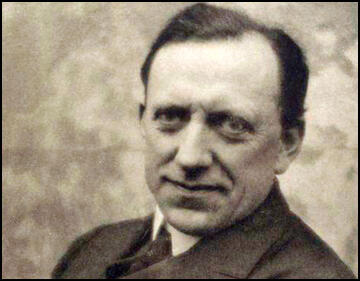
On this day in 1966 James Pope, died. Pope was born in Jonesboro, Louisiana, on 31st March, 1884. He graduated from the University of Chicago in 1909. He was admitted to the bar and became a lawyer at Boise, Idaho. Over the next few years he served as deputy collector of internal revenue (1916), city attorney (1916-17), a member of the board of education (1924-29) and mayor of Boise (1929-33).
A member of the Democratic Party, Pope was elected to the Senate in 1932. On 8th February, 1934, Gerald Nye submitted a Senate Resolution calling for an investigation of the munitions industry by the Senate Foreign Relations Committee under Key Pittman of Nevada. Pittman disliked the idea and the resolution was referred to the Military Affairs Committee. It was eventually combined with one introduced earlier by Arthur H. Vandenberg.
The Military Affairs Committee accepted the proposal and as well as Nye and Vandenberg, the Munitions Investigating Committee included Pope, Homer T. Bone of Washington, Joel B. Clark of Missouri, Walter F. George of Georgia and W. Warren Barbour of New Jersey. John T. Flynn, a writer with the New Republic magazine, was appointed as an advisor and Alger Hiss as the committee's legal assistant.
Public hearings before the Munitions Investigating Committee began on 4th September, 1934. In the reports published by the committee it was claimed that there was a strong link between the American government's decision to enter the First World War and the lobbying of the the munitions industry. The committee was also highly critical of the nation's bankers. In a speech in 1936 Nye argued that "the record of facts makes it altogether fair to say that these bankers were in the heart and center of a system that made our going to war inevitable".
Pope was an unsuccessful candidate for renomination in 1938. The following year President Franklin D. Roosevelt appointed Pope as a director of the Tennessee Valley Authority. He held the post until 1951.
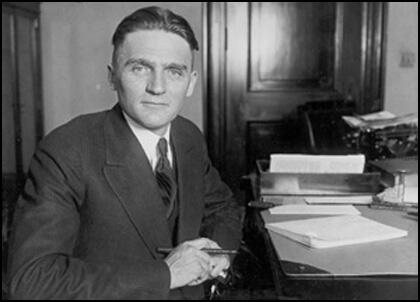
On this day in 2007 E. Howard Hunt died. Everette Howard Hunt was born in Hamburg, on 9th October, 1918. During the Second World War Hunt served in the Office of Strategic Services. After the war he joined the Central Intelligence Agency (CIA) and for a while was stationed in China. While there he met and married Dorothy Wetzel.
In 1949 Hunt establish the first postwar CIA station in Mexico City. He also worked closely with President Anastasio Somoza of Nicaragua. In his spare time Hunt wrote spy novels. This included East of Farewell (1942) Limit of Darkness (1944), Stranger in Town (1947), Bimini Run (1949) and The Violent Ones (1950). Hunt was involved in clandestine operations in Guatemala against President Jacobo Arbenz. The plot against Arbenz became part of Executive Action (a plan to remove unfriendly foreign leaders from power).
Tracy Barnes was eventually placed in charge of what became known as Operation Success. David Atlee Phillips was appointed to run the propaganda campaign against Arbenz's government. According to Phillips he initially questioned the right of the CIA to interfere in Guatemala: In his autobiography Phillips claims he said to Barnes: "But Arbenz became President in a free election. What right do we have to help someone topple his government and throw him out of office?" However, Barnes convinced him that it was vital important that the Soviets did not establish a "beachhead in Central America".
The CIA propaganda campaign included the distribution of 100,000 copies of a pamphlet entitled Chronology of Communism in Guatemala. They also produced three films on Guatemala for showing free in cinemas. David Atlee Phillips, along with Hunt, was responsible for running the CIA's Voice of Liberation radio station. Faked photographs were distributed that claimed to show the mutilated bodies of opponents of Arbenz. William (Rip) Robertson was also involved in the campaign against Arbenz.
The CIA began providing financial and logistic support for Colonel Carlos Castillo. With the help of resident Anastasio Somoza, Castillo had formed a rebel army in Nicaragua. It has been estimated that between January and June, 1954, the CIA spent about $20 million on Castillo's army.
On 18th June 1954 aircraft dropped leaflets over Guatemala demanding that Arbenz resign immediately or else the county would be bombed. CIA's Voice of Liberation also put out similar radio broadcasts. This was followed by a week of bombing ports, ammunition dumps, military barracks and the international airport.
Carlos Castillo's collection of soldiers now crossed the Honduran-Guatemalan border. His army was outnumbered by the Guatemalan Army. However, the CIA Voice of Liberation successfully convinced Arbenz's supporters that two large and heavily armed columns of invaders were moving towards Guatemala City.
The CIA was also busy bribing Arbenz's military commanders. It was later discovered that one commander accepted $60,000 to surrender his troops. Ernesto Guevara attempted to organize some civil militias but senior army officers blocked the distribution of weapons. Arbenz now believed he stood little chance of preventing Castillo gaining power. Accepting that further resistance would only bring more deaths he announced his resignation over the radio.
In 1959 Hunt visited Cuba and decided that Fidel Castro posed a serious threat to the security of the United States: "I wrote a top secret report, and I had five recommendations, one of which was the one that's always been thrown at me, is that during... or... slightly antecedent to an invasion, Castro would have to be neutralized - and we all know what that meant, although I didn't want to say so in a memorandum with my name on it." Hunt played an important role in planning the failed Bay of Pigs invasion.
Hunt was CIA station chief in Mexico during the early 1960s and was rumoured to have been involved in the conspiracy to assassinate John F. Kennedy. It was falsely claimed that he was one of the men arrested in Dallas on the day of the murder.
In 1970 E. Howard Hunt officially retired from the the Central Intelligence Agency. On the advice of Richard Helms, Hunt went to work for Robert F. Bennett, the head of the Robert Mullen & Co, a small public relations company in Washington.
On 7th July, 1971, Charles Colson and John Ehrlichman appointed Hunt to the White House staff. Working under Egil Krogh and G. Gordon Liddy, Hunt became a member of the Special Investigations Group (SIG). The group was (informally known as "the Plumbers" because their job was to stop leaks from Nixon's administration).
On 15th May, 1972, Arthur Bremer tried to assassinate George Wallace at a presidential campaign rally in Laurel, Maryland. Wallace was hit four times. Three other people, Alabama State Trooper Captain E. C. Dothard, Dora Thompson, a Wallace campaign volunteer, and Nick Zarvos, a Secret Service agent, were also wounded in the attack.
Richard Nixon was deeply shocked by this event. He told Charles Colson, a member of his White House staff, that he was concerned that Bremer “might have ties to the Republican Party or, even worse, the President’s re-election committee”. Colson now phoned Hunt and asked him to break-in to Bremer's apartment to discover if he had any documents that linked him to Nixon or his main political opponent in the presidential election, George McGovern. According to Hunt's autobiography, Undercover, he refused to carry out this order.
Bob Woodward reported in the Washington Post: "Within hours of the Wallace assassination attempt, a White House official was asked by the Washington Post about the identity of the governor's attacker. During a subsequent conversation that evening, the official raised the possibility of Bremer's connection to leftist causes and the campaign of Sen. George McGovern, through literature found in his apartment.... One White House source said that when President Nixon was informed of the shooting, he became deeply upset and voiced concern that the attempt on Gov. Wallace's life might have been made by someone with ties to the Republican Party or the Nixon campaign."
It later emerged that Federal Bureau of Investigation officers found both left-wing and right-wing propaganda in Bremer's apartment. They also found a diary where Bremer wrote about his plans to kill George Wallace or Richard Nixon . The opening sentence was: "Now I start my diary of my personal plot to kill by pistol either Richard Nixon or George Wallace." The diary was eventually published as a book, An Assassin's Diary (1973).
Local reporters later claimed that the FBI left Bremer’s home for around 90 minutes before coming back and sealing it. During this time reporters and other unidentified figures took away papers from Bremer’s apartment
Later that year the SIG became concerned about the activities of Daniel Ellsberg. He was a former member of the McNamara Study Group which had produced the classified History of Decision Making in Vietnam, 1945-1968. Ellsberg, disillusioned with the progress of the war, believed this document should be made available to the public. Ellsberg gave a copy of what later became known as the Pentagon Papers to Phil Geyelin of the Washington Post. Katharine Graham and Ben Bradlee decided against publishing the contents on the document.
Daniel Ellsberg now went to the New York Times and they began publishing extracts from the document on 13th June, 1971. This included information that Dwight Eisenhower had made a secret commitment to help the French defeat the rebellion in Vietnam. The document also showed that John F. Kennedy had turned this commitment into a war by using a secret "provocation strategy" that led to the Gulf of Tonkin incidents and that Lyndon B. Johnson had planned from the beginning of his presidency to expand the war.
On 3rd September, 1971, Hunt and Gordon Liddy supervised the burglary of a psychiatrist who had been treating Ellsberg. The main objective was to discover incriminating or embarrassing information to discredit Ellsberg.
Another project involved the stealing of certain documents from the safe of Hank Greenspun, the editor of the Las Vegas Sun. Later, James W. McCord claimed that Greenspun was being targeted because of his relationship with Robert Maheu and Howard Hughes.
In 1972 Gordon Liddy joined the Committee to Re-Elect the President (CREEP). Later that year Liddy presented Nixon's attorney general, John N. Mitchell, with an action plan called Operation Gemstone. Liddy wanted a $1 million budget to carry out a series of black ops activities against Nixon's political enemies. Mitchell decided that the budget for Operation Gemstone was too large. Instead he gave him $250,000 to launch a scaled-down version of the plan.
One of Liddy's first tasks was to place electronic devices in the Democratic Party campaign offices in an apartment block called Watergate. Liddy wanted to wiretap the conversations of Larry O'Brien, chairman of the Democratic National Committee and R. Spencer Oliver, executive director of the Association of State Democratic Chairmen. This was not successful and on 3rd July, 1972, Frank Sturgis, Virgilio Gonzalez, Eugenio Martinez, Bernard L. Barker and James W. McCord returned to the Watergate offices. However, this time they were caught by the police.
The phone number of E. Howard Hunt was found in address books of two of the burglars. Reporters were able to link the break-in to the White House. Bob Woodward, a reporter working for the Washington Post was told by a friend who was employed by the government, that senior aides of President Richard Nixon, had paid the burglars to obtain information about its political opponents.
Hunt threatened to reveal details of who paid him to organize the Watergate break-in. Dorothy Hunt took part in the negotiations with Charles Colson. According to investigator Sherman Skolnick, Hunt also had information on the assassination of John F. Kennedy. He argued that if "Nixon didn't pay heavy to suppress the documents they had showing he was implicated in the planning and carrying out, by the FBI and the CIA, of the political murder of President Kennedy"
James W. McCord claimed that Dorothy Hunt told him that at a meeting with her husband's attorney, William O. Buttmann, she revealed that Hunt had information that would "blow the White House out of the water".
In October, 1972, Dorothy attempted to speak to Charles Colson. He refused to talk to her but later admitted to the New York Times that she was "upset at the interruption of payments from Nixon's associates to Watergate defendants."
On 15th November, Colson met with Richard Nixon, H. R. Haldeman and John Ehrlichman at Camp David to discuss Howard Hunt's blackmail threat. John N. Mitchell was also getting worried by Dorothy Hunt's threats and he asked John Dean to use a secret White House fund to "get the Hunt situation settled down". Eventually it was arranged for Frederick LaRue to give Hunt about $250,000 to buy his silence.
However, on 8th December, 1972, Dorothy Hunt had a meeting with Michelle Clark, a journalist working for CBS. According to Sherman H. Skolnick, Clark was working on a story on the Watergate case: "Ms Clark had lots of insight into the bugging and cover-up through her boyfriend, a CIA operative." Also with Hunt and Clark was Chicago Congressman George Collins.
Dorothy Hunt, Michelle Clark and George Collins took the Flight 533 from Washington to Chicago. The aircraft hit the branches of trees close to Midway Airport: "It then hit the roofs of a number of neighborhood bungalows before plowing into the home of Mrs. Veronica Kuculich at 3722 70th Place, demolishing the home and killing her and a daughter, Theresa. The plane burst into flames killing a total of 45 persons, 43 of them on the plane, including the pilot and first and second officers. Eighteen passengers survived." Hunt, Clark and Collins were all killed in the accident.
The following month Howard Hunt pleaded guilty to burglary and wiretapping and eventually served 33 months in prison. He later told People Magazine (20th May, 1974): ''I had always assumed, working for the CIA for so many years, that anything the White House wanted done was the law of the land. `I viewed this like any other mission. It just happened to take place inside this country.''
In a comprehensive analysis of Hunt’s work published in The New York Review of Books in 1973, Gore Vidal argued that Hunt might have written the diary that was found in the car of Arthur H. Bremer, the man who attempted to assassinate George Wallace.
Howard Hunt continued to write spy novels and titles included Give Us This Day (1973) and The Berlin Ending (1973). Hunt also published the novel The Hargrave Deception. The book was based on the James Angleton investigation of Kim Philby.
In August, 1978, Victor Marchetti published an article about the assassination of John F. Kennedy in the liberty Lobby newspaper, Spotlight. In the article Marchetti argued that the House Special Committee on Assassinations (HSCA) had obtained a 1966 CIA memo that revealed Hunt, Frank Sturgis and Gerry Patrick Hemming had been involved in the plot to kill Kennedy. Marchetti's article also included a story that Marita Lorenz had provided information on this plot. Later that month Joseph Trento and Jacquie Powers wrote a similar story for the Sunday News Journal.
The HSCA did not publish this CIA memo linking its agents to the assassination of John F. Kennedy. Hunt now decided to take legal action against the Liberty Lobby and in December, 1981, he was awarded $650,000 in damages. Liberty Lobby appealed to the United States Court of Appeals. It was claimed that Hunt's attorney, Ellis Rubin, had offered a clearly erroneous instruction as to the law of defamation. The three-judge panel agreed and the case was retried. This time Mark Lane defended the Liberty Lobby against Hunt's action.
Lane eventually discovered Marchetti’s sources. The main source was William Corson. It also emerged that Marchetti had also consulted James Angleton and Alan J. Weberman before publishing the article. As a result of obtaining of getting depositions from David Atlee Phillips, Richard Helms, G. Gordon Liddy, Stansfield Turner and Marita Lorenz, plus a skillful cross-examination by Lane of Hunt, the jury decided in January, 1995, that Marchetti had not been guilty of libel when he suggested that John F. Kennedy had been assassinated by people working for the CIA.
As a result of the failed legal action, in June, 1995, Hunt filed for bankruptcy protection from his creditors. Hunt spent his final years quietly in his home in Miami's Biscayne Park neighborhood with his second wife, Laura Martin Hunt.
In 2006 it was announced that Hunt had written his memoirs. This included a claim that Lyndon Baines Johnson might have been involved in ordering the assassination of John F. Kennedy. "Having Kennedy liquidated, thus elevating himself to the presidency without having to work for it himself, could have been a very tempting and logical move on Johnson's part. LBJ had the money and the connections to manipulate the scenario in Dallas and is on record as having convinced JFK to make the appearance in the first place. He further tried unsuccessfully to engineer the passengers of each vehicle, trying to get his good buddy, Gov. (John) Connolly, to ride with him instead of in JFK's car - where... he would have been out of danger."
Hunt suggests that senior CIA official, William K. Harvey could have been involved in the plot to kill Kennedy: "Harvey was a ruthless man who was not satisfied with his position in the CIA and its government salary... He definitely had dreams of becoming (CIA director) and LBJ could do that for him if he were president.... (LBJ) would have used Harvey because he was available and corrupt."
Edward Howard Hunt died of pneumonia on 23rd January, 2007. His memoir American Spy: My Secret History in the CIA, Watergate, and Beyond was published in May 2007.
After his father's death, Saint John Hunt, released a tape where his father claimed that Lyndon Baines Johnson was the instigator of the assassination of John F. Kennedy, and that it was organised by Cord Meyer, David Atlee Phillips, Frank Sturgis and David Sanchez Morales.
